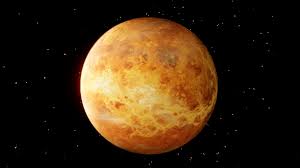The hottest planet in our solar system is Venus. With an average surface temperature of 462 degrees Celsius (864 degrees Fahrenheit), it is hotter than Mercury, the closest planet to the Sun. Venus is also known as the Earth’s sister planet because it has a similar size, mass, and composition. However, its extreme temperature and toxic atmosphere make it a very inhospitable place for life.

Table of Contents
So why is Venus so hot?
The main reason is its proximity to the Sun. Venus is the second planet from the Sun and receives about twice as much solar radiation as Earth. This intense heat causes the planet’s surface to heat up to extreme temperatures. In addition, Venus has a thick atmosphere that traps heat and creates a greenhouse effect. The atmosphere is composed mainly of carbon dioxide, which is a powerful greenhouse gas. This greenhouse effect is so strong that the surface temperature on Venus is hot enough to melt lead.
Venus’s atmosphere is also very dense and is 90 times thicker than Earth’s atmosphere. The high atmospheric pressure on Venus’s surface is equivalent to the pressure at a depth of 1 kilometer in Earth’s oceans. The dense atmosphere on Venus traps heat, which further contributes to the planet’s high temperature.
Despite its harsh conditions, scientists are still interested in studying Venus. In the past, many spacecraft have been sent to Venus to study its atmosphere, geology, and surface features. In September 2021, NASA’s Parker Solar Probe flew by Venus on its way to study the Sun’s outer atmosphere. The spacecraft took advantage of Venus’s gravity to adjust its orbit and get closer to the Sun.
Who is Earth’s Sister Planet?
Venus is often referred to as Earth’s sister planet because of its similar size, mass, and composition. Both planets are rocky and terrestrial, which means they have a solid surface rather than a gaseous one like Jupiter or Saturn. Venus and Earth are also located relatively close to each other in the solar system, with Venus being the second planet from the Sun and Earth being the third.
However, despite these similarities, Venus is a very different planet from Earth in many ways. Venus has a thick, toxic atmosphere that is composed mainly of carbon dioxide, while Earth’s atmosphere is mainly nitrogen and oxygen. The surface temperature on Venus is also much hotter than on Earth, making it an extremely inhospitable environment. Despite these differences, scientists continue to study Venus to learn more about the formation and evolution of rocky planets in our solar system.
Conclusion
In conclusion, Venus is the hottest planet in our solar system due to its proximity to the Sun, its thick atmosphere, and the greenhouse effect caused by carbon dioxide. Despite its harsh conditions, scientists continue to study Venus to learn more about our neighboring planets and the evolution of our solar system.
Hottest Planet in Solar System : Summary
- Venus is the hottest planet in our solar system, with an average surface temperature of 462 degrees Celsius.
- Venus is often referred to as Earth’s sister planet because of its similar size, mass, and composition.
- Venus has a thick, toxic atmosphere composed mainly of carbon dioxide, while Earth’s atmosphere is mainly nitrogen and oxygen.
- The high temperature on Venus is caused by its proximity to the Sun and a thick atmosphere that traps heat and creates a greenhouse effect.
- Venus’s atmosphere is 90 times thicker than Earth’s atmosphere, which creates a high atmospheric pressure on Venus’s surface.
- Scientists are interested in studying Venus to learn more about our neighboring planets and the evolution of our solar system.
- Many spacecraft have been sent to Venus in the past to study its atmosphere, geology, and surface features.
- NASA’s Parker Solar Probe recently flew by Venus on its way to study the Sun’s outer atmosphere.
- Venus and Earth are both terrestrial planets with a solid surface, unlike gas giants like Jupiter or Saturn.
- Despite their similarities, Venus and Earth are very different planets with vastly different environments.
Hottest Planet in Solar System : MCQ
Q. What is the main reason for Venus being the hottest planet in our solar system?
a. Its thick, toxic atmosphere.
b. Its proximity to the Sun.
c. Its similar size to Earth.
d. Its solid surface.
Answer: b. Venus is the hottest planet in our solar system due to its proximity to the Sun, which causes it to receive about twice as much solar radiation as Earth.
Explanation: As stated in the summary above, Venus is the hottest planet in our solar system due to its proximity to the Sun. While Venus and Earth are similar in size and composition, it is the intense heat from the Sun that causes Venus’s surface to heat up to extreme temperatures. The other options, such as its thick, toxic atmosphere or its solid surface, are not the main reason for Venus’s high temperature.
Important Links